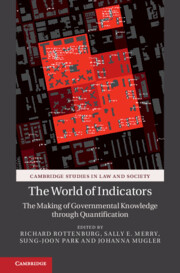The World of Indicators
The twenty-first century has seen a further dramatic increase in the use of quantitative knowledge for governing social life after its explosion in the 1980s. Indicators and rankings play an increasing role in the way governmental and non-governmental organizations distribute attention, make decisions, and allocate scarce resources. Quantitative knowledge promises to be more objective and straightforward as well as more transparent and open for public debate than qualitative knowledge, thus producing more democratic decision-making. However, we know little about the social processes through which this knowledge is constituted nor its effects. Understanding how such numeric knowledge is produced and used is increasingly important as proliferating technologies of quantification alter modes of knowing in subtle and often unrecognized ways. This book explores the implications of the global multiplication of indicators as a specific technology of numeric knowledge production used in governance.
- Combination of insights from anthropology of law, history of science, science and technology studies, sociology of quantification, economics and geography will appeal to those who are uncomfortable with the separation between 'theoretical' and 'empirical' approaches and with the current weakness of critique that address the main trends shaping the relations between capitalism, markets, law and democracy
- Theoretical discussion of the nature and historical formation of quantification will appeal to those who ask questions such as, 'What is new or different about our contemporary reliance on quantitative knowledge?'
- Groundbreaking empirical case studies uncover the social work and politics that often go into the making of indicators and explore the far-reaching effects and impacts of these numerical representations in specific settings
Product details
January 2016Hardback
9781107086227
381 pages
235 × 157 × 22 mm
0.66kg
7 b/w illus. 3 tables
Available
Table of Contents
- 1. Introduction: a world of indicators: the making of governmental knowledge through quantification Richard Rottenburg and Sally Engle Merry
- 2. The flight of the indicator Theodore M. Porter
- 3. Narrating numbers Wendy Espeland
- 4. By their own account: (quantitative) accountability, numerical reflexivity and the National Prosecuting Authority in South Africa Johanna Mugler
- 5. Failure by the numbers? Settlement statistics as indicators of state performance in South African land restitution Olaf Zenker
- 6. Doing the transparent state: open government data as performance indicators Evelyn Ruppert
- 7. Charting the road to eradication: health facility data and malaria indicator generation in rural Tanzania Rene Gerrets
- 8. 'Nobody is going to die': an ethnography of hope, indicators, and improvisations in the provision of access to treatment in Uganda Sung-Joon Park
- 9. The role of indicators in the global financial crisis Andrew Farlow
- 10. New global vision of microfinance: the construction of markets from indicators Barbara Grimpe
- 11. Spirits of neoliberalism: 'competitiveness' and 'wellbeing' indicators as rival orders of worth William Davies
- 12. Climate change vulnerability indicators – from noise to signal Till Sterzel, Boris Orlowsky, Hannah Förster, Anja Weber and Dennis Eucker
- 13. Retroaction: how indicators feed back onto quantified actors Alain Desrosieres.










